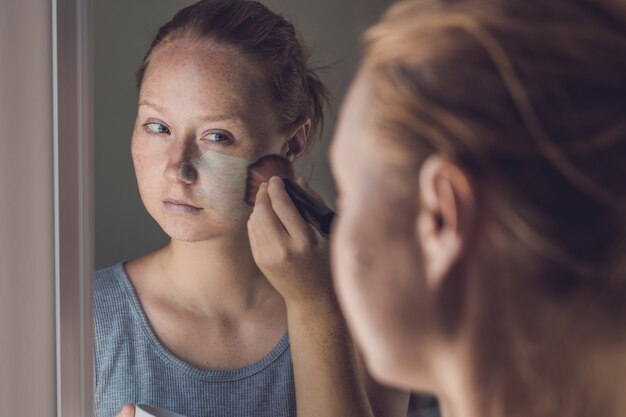Banish Acne: A Complete Guide to Clearer Skin
For millions worldwide, acne is a dreaded skin issue that not only affects appearance but also self-esteem and confidence. If you've ever stood in front of the mirror feeling frustrated about your skin, you're definitely not alone. But worry not—there are effective ways to tackle acne from multiple angles. Let’s delve into practical, reader-friendly strategies on how to treat acne, ensuring that you’re armed with the best knowledge to make informed decisions.
Understanding Acne: A Quick Overview
What Is Acne?
Acne is a common skin condition that occurs when hair follicles become clogged with oil and dead skin cells. It often causes whiteheads, blackheads, or pimples, and usually appears on the face, forehead, chest, upper back, and shoulders.
Who Gets Acne?
While teens are commonly affected due to hormonal changes, acne can affect people of all ages. Factors like stress, dietary habits, and genetics also play a role.
Types of Acne
- Whiteheads and blackheads: Non-inflammatory and considered mild acne.
- Papules and pustules: Small red bumps or blisters filled with pus.
- Nodules and cysts: Painful lumps beneath the skin that require careful attention.
Understanding these types can help in choosing the appropriate treatment method.
The Basics: Gentle Skincare Routine 🛁
Cleanse with Care
Cleanliness is crucial. Choose a gentle, non-abrasive cleanser. Overwashing or using harsh soaps can irritate the skin and exacerbate acne. Aim to wash your face twice a day and after sweating.
Moisturize
Even oily skin needs moisture. Opt for a non-comedogenic moisturizer that won't clog your pores but will keep your skin hydrated and balanced.
Exfoliate Wisely
Regular exfoliation helps remove dead skin cells but should be done sparingly to prevent irritation. Use an exfoliator with mild ingredients and aim for once a week.
Topical Treatments: What to Look For 🔬
Over-the-Counter Options
- Benzoyl peroxide: Reduces bacteria and helps prevent future acne.
- Salicylic acid: Aids in unclogging pores.
- Alpha hydroxy acids: Exfoliate and help reduce inflammation.
Prescription Options
For more severe cases, dermatologists may recommend topical retinoids or antibiotics to effectively target breakouts.
Lifestyle and Diet: You Are What You Eat 🍏
Eating for Clear Skin
- Increase intake of omega-3 fatty acids: Found in fish and flaxseed, these help reduce inflammation.
- Limit dairy and high-glycemic foods: Some studies suggest these can aggravate acne.
Stay Hydrated
Drinking enough water helps maintain skin's elasticity and overall health; aim for at least 8 glasses a day.
Manage Stress
Stress affects hormones that trigger acne. Practices like yoga or meditation can help balance stress levels and improve skin health.
When Acne Persists: Exploring Advanced Treatments 💉
Laser and Light Therapy
These treatments target the deeper layers of the skin to reduce the appearance of scars and prevent future outbreaks.
Chemical Peels
A professional chemical peel can help reduce acne scars and encourage new skin growth.
Microdermabrasion
This involves exfoliating the top layer of skin to improve texture and tone, often used in combination with other treatments.
Embracing Natural Alternatives 🌿
Tea Tree Oil
Known for its anti-inflammatory properties, tea tree oil can be an effective alternative for those preferring natural remedies.
Aloe Vera
With its soothing properties, aloe vera can be applied to reduce redness and promote healing.
Honey and Cinnamon
Both ingredients have antibacterial properties that can help reduce pimple size and prevent future breakouts.
Building a Support System: You're Not Alone 🤗
Connect with Others
Join support groups or online forums where you can share your journey and learn from others facing similar challenges.
Seek Professional Help
Consulting a dermatologist ensures you receive personalized advice tailored to your skin type and condition.
Final Words: Patience and Persistence 🍂
Treating acne is a journey that requires consistency and patience. Noticeable changes may take weeks or even months, but with the right regimen, progress can be achieved. Remember, every skin type is unique, and it might take some trial and error to find what works best for you. Stay informed, be gentle with your skin, and celebrate small wins along the way.
Key Takeaways to Combat Acne:
- 🎯 Tailor your routine: Choose gentle, non-comedogenic products.
- 🪥 Exfoliate sparingly: Once a week is typically sufficient.
- 💧 Stay hydrated: Aim for at least 8 glasses of water daily.
- 🍏 Mind your diet: Focus on omega-3 rich foods, reduce dairy intake.
- 🧘 Manage stress: Incorporate stress-reducing practices like yoga.
- 🌿 Consider natural remedies: Tea tree oil and aloe vera can be beneficial.
- 🤝 Don’t hesitate to seek help: Professional guidance can provide personalized strategies.
By following these steps and understanding your skin's unique needs, you're setting the foundation for clearer, healthier skin. Remember, persistence is key—and clearer skin is achievable. 🌟

